Stock are getting through broken fences on sodden farms in the North Island and gobbling feed normally shut up for the lean winter months while in Southland and parts of Otago no substantial rain has fallen for the past four months leaving paddocks dry and feed supplies low. Listen to On the Farm for more on conditions on farms and orchards around the country.
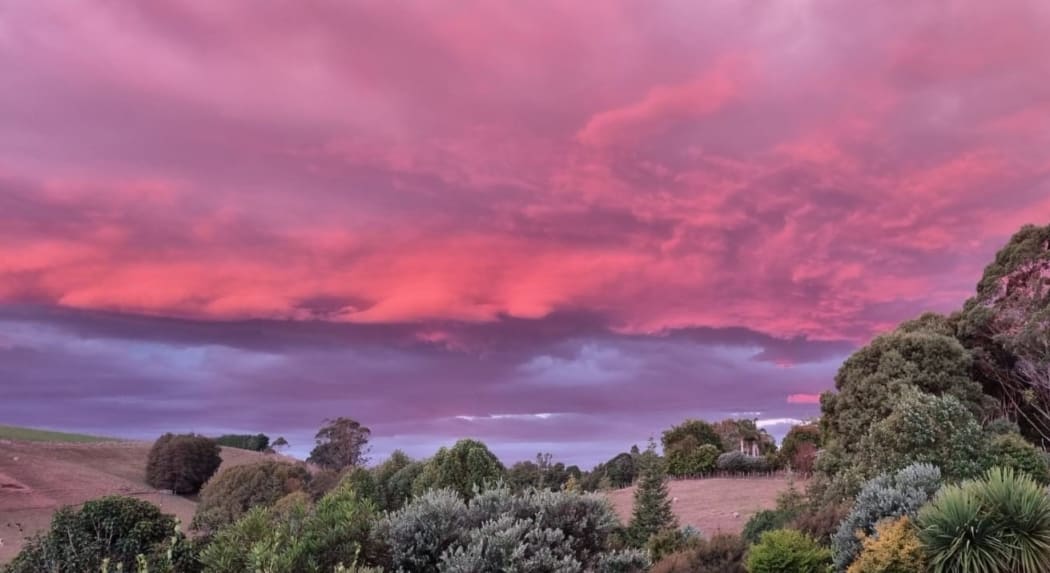
Sunset near Pukekohe Photo: supplied
A farmer near Whangārei was enjoying a delightful start to the day weatherwise when we rang. They had had variable rain in Northland over the week and could do with more. The region's west coast is really quite dry and farmers are going through winter feed reserves quickly. Not being able to get stock away to slaughter is putting the stress on. Most of the maize is off now with mixed yields. Some crops have been hit by army worm which can wipe a crop out overnight.
Our contact in Pukekohe says, and no fooling, except for greener grass, there is no indication that heavy rain fell last week. The days have been sunny, fine and warm necessitating a return to irrigation for maturing crops and new transplants of crops like brassicas and lettuce. It has been excellent weather for harvesting kiwifruit.
It has been very hot and sunny in Waikato - 27 degree days and no rain. It is hard to get new grass planted and some farmers are starting to dry off some of their cows for the season.
A rogue thunder shower dropped a few millimetres on the odd King Country farm this week. Places had 70 to 100 millimetres the week before but the region needs more to be set up for winter. Mornings are cool but the afternoons have been belting hot. The rams are out and calves are being weaned. Here, too, getting stock away is hard work and often there is little notice of cancelled bookings at the works such as a phone call the night before saying they can't take stock as planned because of staffing issues.
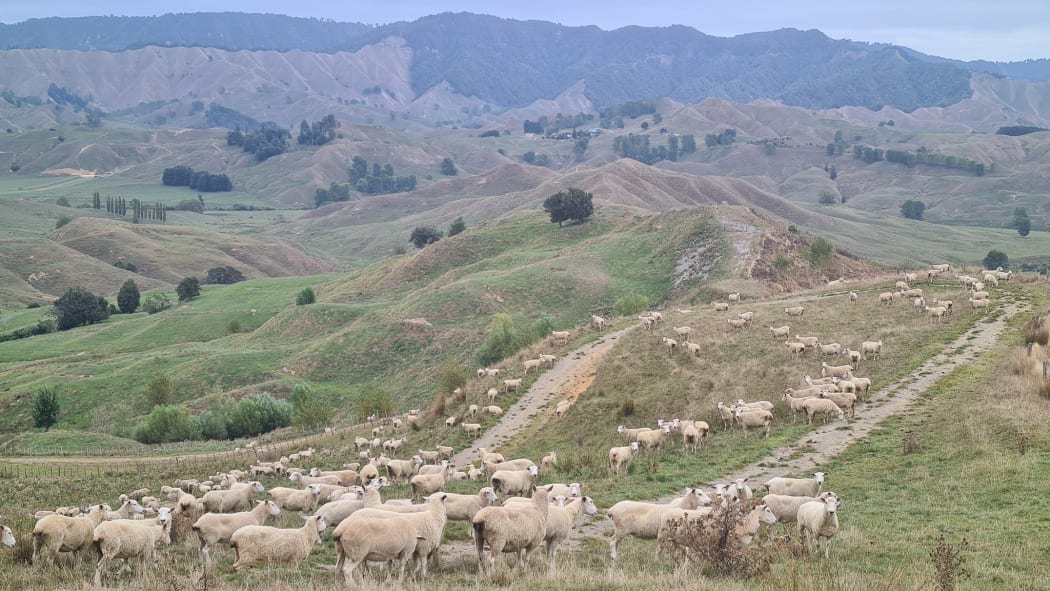
King Country Photo: Anna Nelson
It is all hands to the deck for picking kiwifruit in Bay of Plenty especially with labour shortages and quite a bit of rain in the last week holding things up. An orchard may get clearance to pick but will have to wait its turn for pickers. There are backlogs at the packhouse too. Generally the fruit is looking good and surprisingly the same volume of fruit has been picked to date as last year.
It was a return to the milking shed on Friday morning for our Taranaki farm owner who was covering for an employee who had Covid in the household. Days are getting shorter but nature has been kind weather-wise. Maize for silage is pretty well through being harvested in the north of the region and grass is growing nicely this autumn.
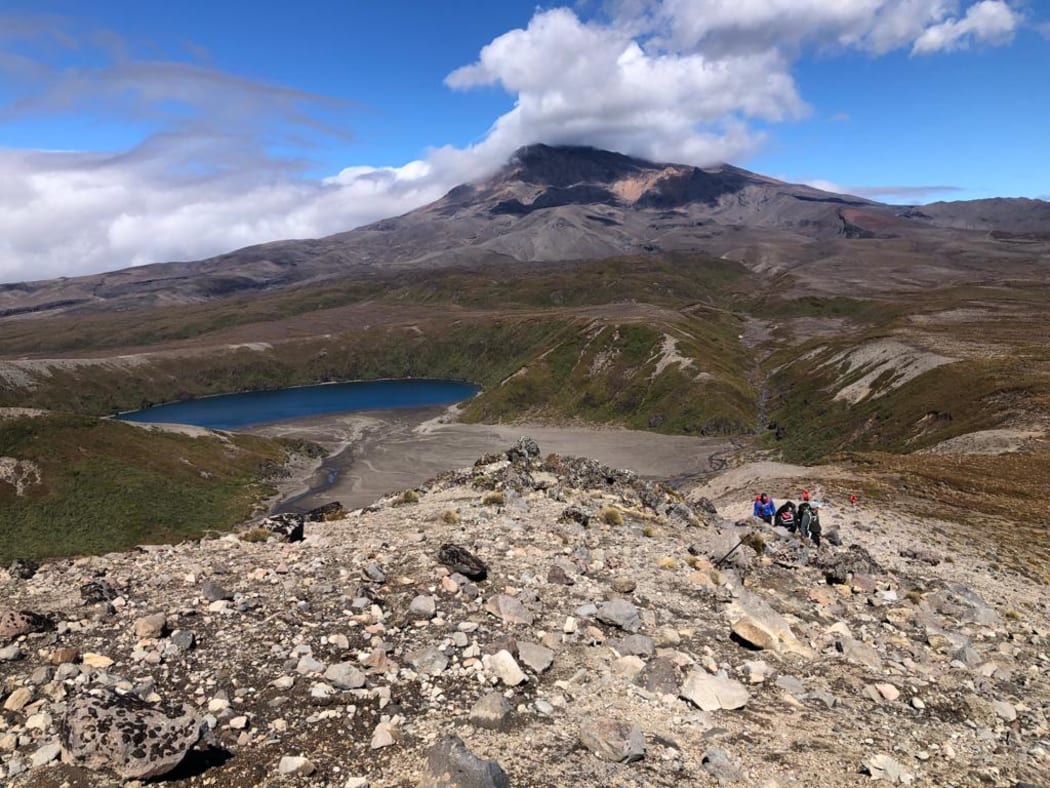
Tama Lakes, National Park Photo: RNZ/Sally Round
Across the island and the sun was peeping out in Wairoa when we rang which brightened the mood of farmers hit by massive flooding. Steady rain earlier in the week had tapered off to the odd light shower by Friday. About 30,000 to 40,000 hectares of farmland has been seriously affected. The rams had just gone out on farms which were then deluged so there is concern lamb numbers will be down this spring. The floods damaged fences so paddocks normally shut up to grow feed for the lean winter months are being gobbled down as quickly as stock can get to them. Sodden land is continuing to slip but our contact says the authorities are doing a good job of clearing the way through for vehicles and ensuring isolated people are supported. "Wet, wet, wet" is the refrain, too, further north in Tairāwhiti. Road closures mean it is tricky getting stock to the works or to the saleyards.
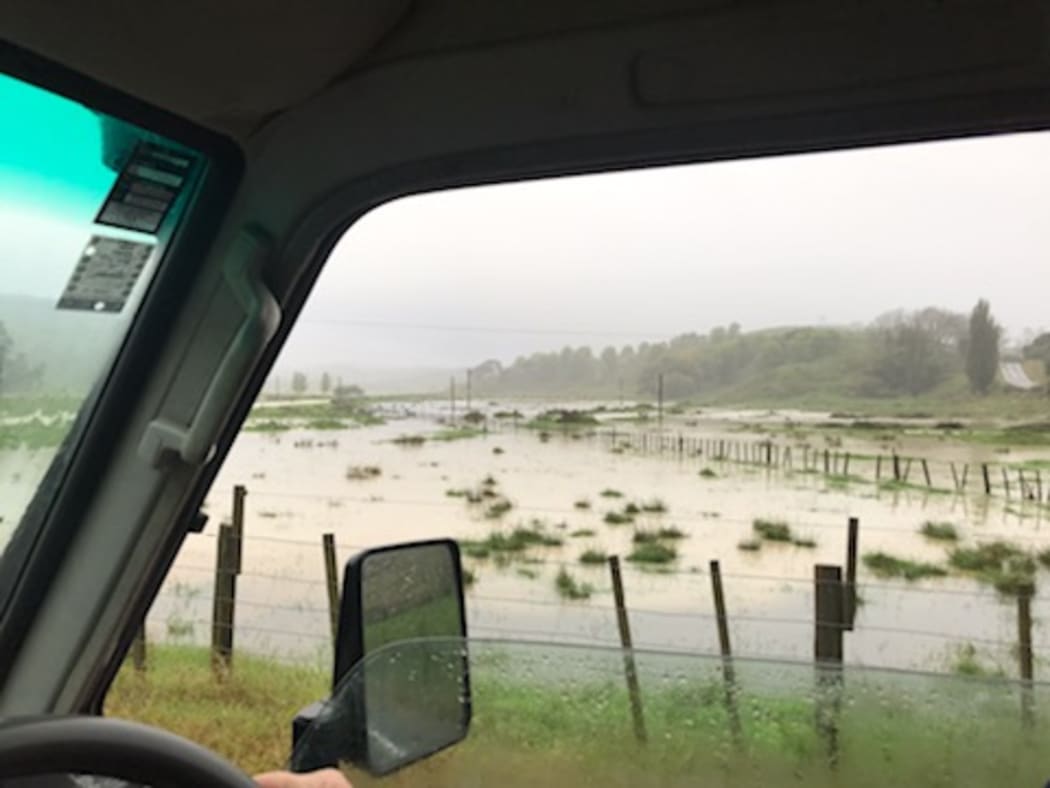
Thousands of hectares of farmland near Wairoa has been seriously affected by floods. Photo: Supplied/ Alan Newton
It's a wrap for our vineyard contact in Hawke's Bay and he is pretty pleased with the quality of the fruit and the overall harvest given all the rain they have had. The lambs are in the vineyard now munching between the rows, much earlier than normal. In the winery, reds are being fermented and plunged and chardonnays are going into barrel. It's been the second warmest season on record in terms of growing degree days.
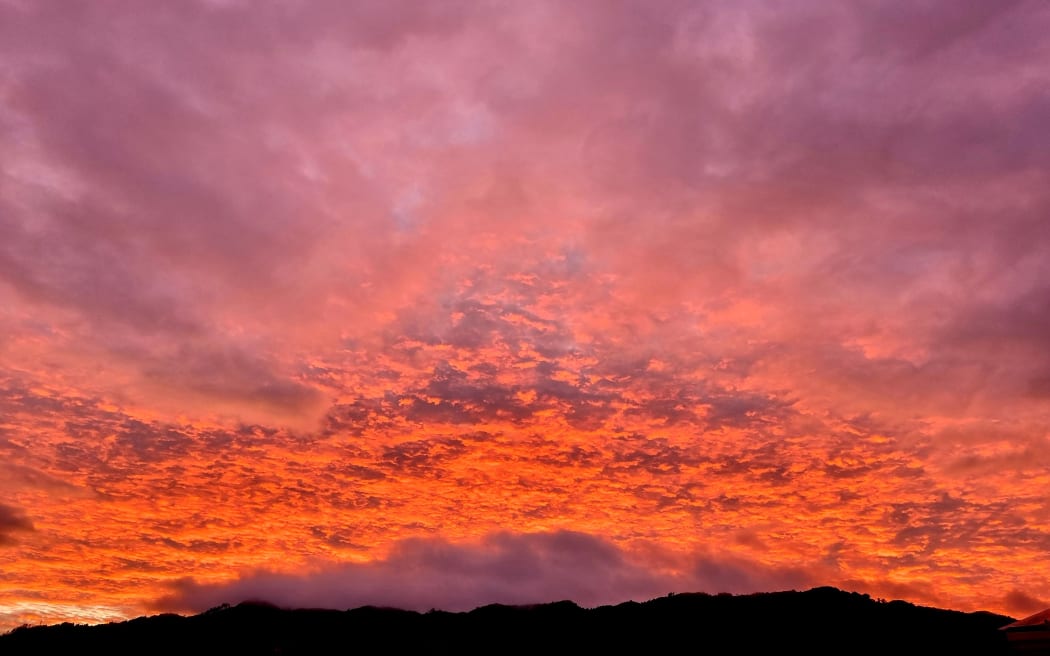
Photo: Joe Porter
An arable farmer in Wairarapa says it has been frustrating not being able to get into the paddocks for the final harvesting of crops because of all the moisture they have had. They finally finished their last paddock of barley yesterday but red clover needs to be harvested in full sun and there just has not been enough of that. Yields are down significantly because of the wet season - peas by half and cereals back by a quarter.
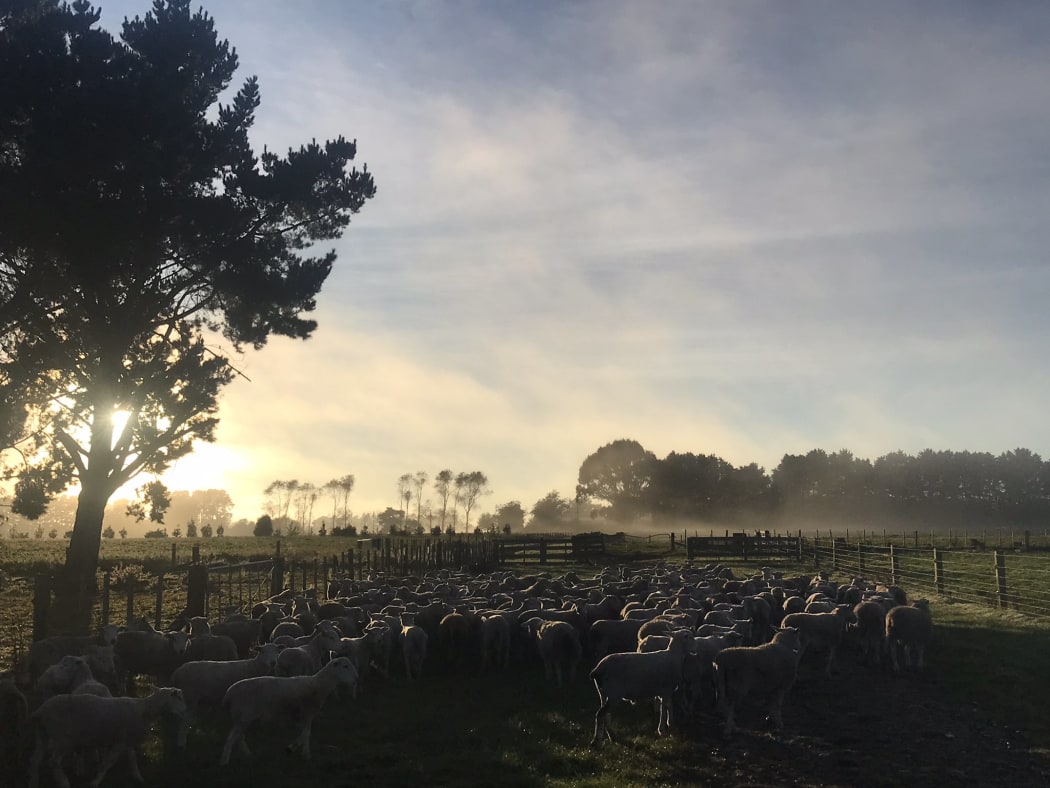
Early morning in Manawatū Photo: William Morrison
It is just peachy in Manawatū - still shorts and T-shirt weather and the rain has come just when needed - 80 to 100mm in the last week to 10 days. The rams are out or just about to head out, all the crops are off and those in the business of finishing lambs have new crops sown. The region is looking at some very good dairy production figures for March - 1.4 kg of milk solids per cow per day compared to 1.2 normally.
The Golden Bay farmer we called says he is feeling for his farming colleagues around the country - those struggling with extreme wet in the North Island and extreme dry in the south. On his farm there has been good autumn growth and 24 degree days - he would like some rain. He is in the final phase of milking for the season with six or seven weeks to go. At this time of the year his cows are milked 10 times in 14 days. It means they walk less and makes working hours for the team more palatable as there are only three early starts a week. The maximum time between milkings is 21 hours. As for milk production, it is on par with last year.
Marlborough is in the thick of its grape harvest. Some harvesting companies are down to half their usual staff numbers with people isolating or having Covid but they are getting the grapes off as quickly as they can and the harvest should be over by Easter. On farms it is starting to get a bit dry. A lot of hay and haylage was made in March which is quite unusual for the region. Quite a few people managed to get a second cut. A farmer says there will be no excuse for poor lambing and calving percentages as there has been so much feed about and animals should be in great nick. The rams are out in some parts of Marlborough. In others they have already done their job and on high country properties they are yet to be let loose.
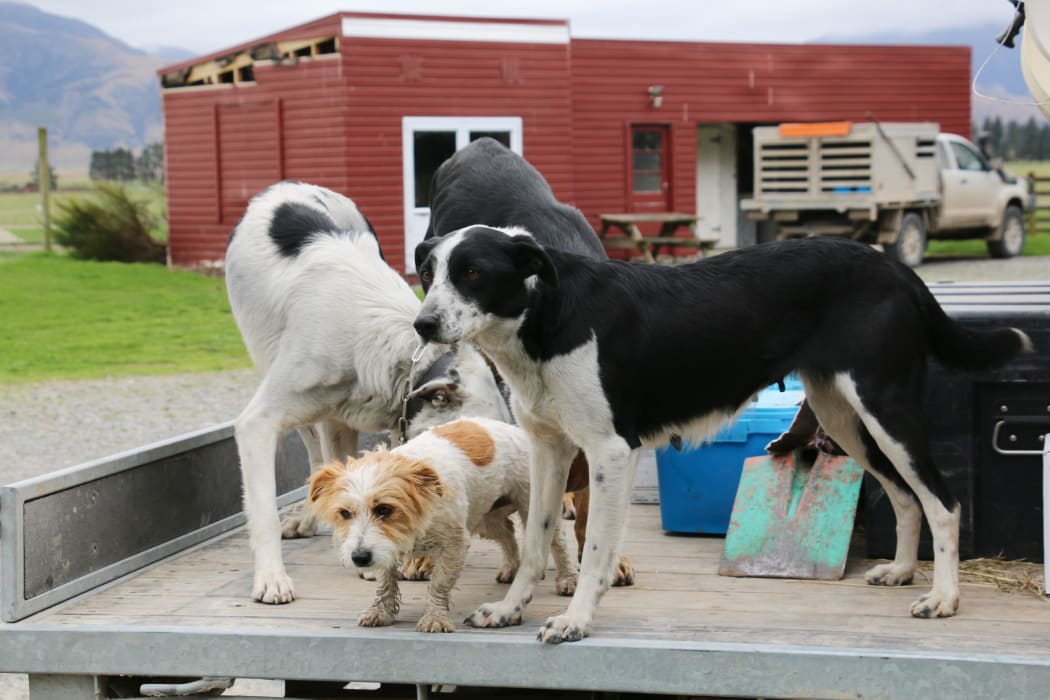
Photo: RNZ / Cosmo Kentish-Barnes
South Westland is very dry and has had the driest summer in the 18 years our contact has been on the farm. She says it is green in parts but not growing. Elsewhere on the farm, where there is more gravel than silt, it has browned off three times this summer. That usually happens once and rarely twice. Temperatures have been in the late teens and early 20s. Cows are milking once a day so they can put on weight before drying off. Season-to-date milk production has been - well - rubbish. There is rain in the forecast for Tuesday next week but the farmer says she will believe it when she sees it.
The strange weather continues in Canterbury with mostly dull overcast weather and not much rain. Feed levels are good although those on lighter soils are turning on irrigators again to keep grass growth going while temperatures are good. Dairy farmers are enjoying the good autumn and making the most of it. Arable farmers are still harvesting the last crops and at the same time planting crops for next year. Store lambs are also being purchased to graze on crop residue and cover crops over the winter months.
Further south things are looking dire. No substantial rain has fallen in Southland and parts of Otago for the past four months, leaving paddocks dry and feed supplies low.
A Balclutha farmer is already using up winter feed reserves to keep weight on his animals and feed lambs that should have gone to the works. He would normally have sent 2000 lambs to the works by now but he still has 1000 of them on farm and can't get them to the meatworks because of delays. He is feeding ewes supplementary feed to keep weight on before the ram goes out. If they are too light that will impact on their ability to conceive and to mother lambs well in spring.
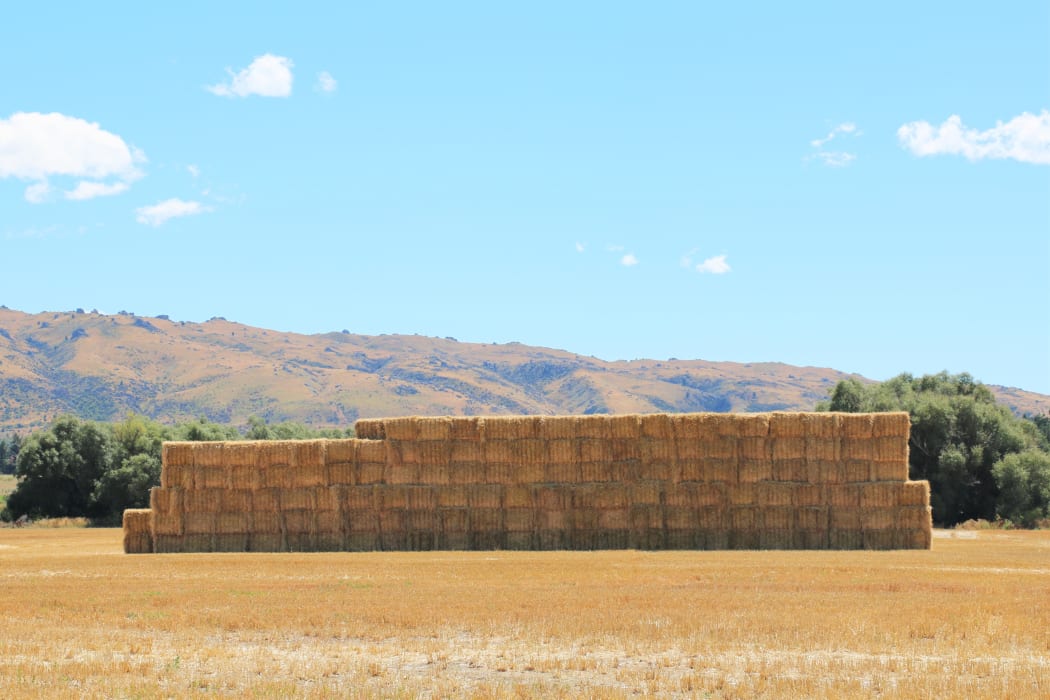
Photo: RNZ / Cosmo Kentish-Barnes
The Minister for Primary Industries this week declared a medium-scale adverse event in Southland, Clutha and Queenstown Lakes districts which has unlocked $100,000 in government funding support. Over summer Invercargill received just 35 percent of its normal rainfall making it the driest summer since records began in 1900. Southland's regional council has told people with water-take consents to stop irrigating for the next two weeks. We are told farmers are very stressed. They are cutting back on milkings and are also digging into feed that was destined to be used in winter.

